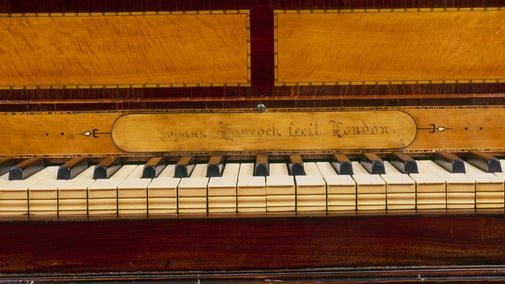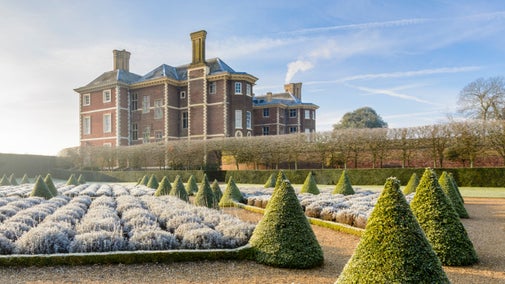
Fenton House and Garden's collections
Explore the objects and works of art we care for at Fenton House and Garden on the National Trust Collections website.

One of London's hidden treasures, Fenton House is a 17th-century house with decorative arts collections just waiting to be discovered. Don’t miss the early keyboard instruments, the playful ceramics, the intricate needlework, the impressive art collection and the far-reaching views over London.
Nestled at the top of the hill in Hampstead, Fenton House is an unexpected gem in the heart of London. The best way to visit us is by public transport - Hampstead underground station is just a 5minute walk away and Hampstead Heath overground station is just 15mins away. Several buses stop within a 5min walk too; check TfL's website for details.
If you're feeling more adventurous we're just 10mins away from Hampstead Heath itself; making Fenton House a perfect stop on any Heath walk. One of the best surprises at Fenton House is the unexpected, sweeping views across the London skyline, compare our view to the one from the gorgeous Parliament Hill viewpoint - only a 25min walk away but a very different perspective. (Top tip - visit us in early Spring before the trees are in full leaf to get the best views!)
Cycling to Fenton House is a breeze, less than 4 miles from central London. There is a hill at the end but with so many cafes on Hampstead High Street, you'll have easily earned your cake. You can find more information on cycling on the Getting here section of our Visitor information.
If driving is what suits you best, please note we don't have a car park at Fenton House - when you see the higgedly historic streets, you'll see why. The nearest car park is Jack Straw's car park, a 7min walk away; charges apply.
See Fenton's ceramics collection, full of vibrant colour and a range of styles, including Chinese porcelain from the Kangxi period, 18th-century Meissen figures and Staffordshire ware. With a range of intricately made and playful subjects, from ceramic poodles and pugs to scenes of revelry and courting couples, there is something for every age and taste.
Explore the art collection of the last owner, Lady Binning, as well as Hampstead actor Peter Barkworth, featuring works by a group of English post-Impressionist painters called the Camden Town Group. See pictures by Clare Atwood, Walter Sickert, Duncan Grant, John Constable and Albrecht Dürer among many others.

Fenton is home to a collection of intricate 17th-century needlework. The fine examples of stumpwork would have been painstakingly created by young women from affluent Stuart homes.
The pieces feature biblical and pastoral scenes and imagery, with doll-like characters dressed in the height of Stuart fashion surrounded by a wonderland of green hills, flowers, birds, bees and animals.
The attic-floor balcony offers one of the highest points in London from which to take in a panoramic view of the city on fine days. Fenton's residents in the late 1600s would have been able to watch the construction of St Paul’s Cathedral. You can still see St Paul's today, now surrounded by the great variety of high-rise buildings that line the River Thames.
The National Trust has been caring for the Major Benton Fletcher collection of early keyboard instruments since 1938. With regular attention from specialist conservators, the Trust is able to keep most of the collection in playing condition so that early keyboard musicians can enjoy and learn from playing original instruments. The earliest dates back to 1540 and is still played regularly.
You can hear 17th and 18th century music being played on the instruments it was written for, with demonstrations by volunteer musicians on our open days.


Explore the objects and works of art we care for at Fenton House and Garden on the National Trust Collections website.
Discover formal lawns, herbaceous borders, exotic planting, a sunken rose garden, kitchen garden and a 300-year-old orchard in Fenton’s garden: a haven in the middle of Hampstead.

Step back in time as you listen to historic instruments being played by our musicians, with the oldest dating back to 1540. Find out more about this unusual collection when you visit Fenton House.

Historic houses and buildings are full of stories, art and collections. Learn more about their past and plan your next visit.

From sprawling mansions to intimate homes and modernist masterpieces, London has it all if you know where to look.
